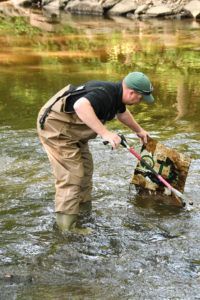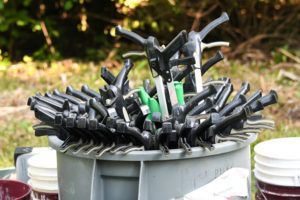OTW: 16th Annual Charlotte River Conservation Day
 The small town of Charlotte is located in the Battle Creek Watershed, this watershed covers 196,750 acres/307 square miles in northern Calhoun, southeastern Barry, and southern Eaton counties. Land use consists primarily of agriculture followed with forestland, wetland, and urban/rural/non-farm. Since the main land use is agriculture non-point source population is the main concern in this area. Non-point source pollution is an indirect way of releasing pollutants into the environment. Examples of this are excess fertilizers, herbicides, and insecticides from agricultural lands and residential areas. Whereas point source pollution is directly releasing pollutants into the environment, examples of this are acid rain, littering, and discharge of wastewater.
The small town of Charlotte is located in the Battle Creek Watershed, this watershed covers 196,750 acres/307 square miles in northern Calhoun, southeastern Barry, and southern Eaton counties. Land use consists primarily of agriculture followed with forestland, wetland, and urban/rural/non-farm. Since the main land use is agriculture non-point source population is the main concern in this area. Non-point source pollution is an indirect way of releasing pollutants into the environment. Examples of this are excess fertilizers, herbicides, and insecticides from agricultural lands and residential areas. Whereas point source pollution is directly releasing pollutants into the environment, examples of this are acid rain, littering, and discharge of wastewater.
Even though nonpoint source pollution is the number one concern of this watershed we can still do our part as Michigan citizens! MUCC’s OTW program which is funded through Consumers Energy has teamed up with the Eaton Conservation District, City of Charlotte, and Well-Head Protection Team in beautifying your hometown river! There will also be a rain garden restoration hosted by the City of Charlotte, trail clearing by Eaton Conservation District and invasive species survey by Wellhead Protection Team
Come on out on Saturday, October 5th at 9 am! Volunteers will meet at Bennett Park Pavilion in Charlotte and we will then proceed to the worksite.
OTW is an amazing way to get outdoors and make a difference in local watersheds. If you would like to attend any of these events, please register online prior to the event and you will receive a free, reusable water bottle, sticker, and lunch. Anyone is welcome to join for a great day of volunteering before the snow begins to fall. OTW still has one more event planned for this fall, so come on out!

Flint River Clean-up : U of M Flint’s Wildlife Club and OTW are teaming up to help out the Flint River!
On Saturday, October 12 at 9 a.m., volunteers will meet in the parking lot behind the University of Michigan-Flint Recreation Center in lot “A”. We will then proceed to the cleanup site. The Flint River is a vibrant ecosystem that supports a wide array of flora, fauna, wildlife, and recreational opportunities.
Lunch will be provided by MUCC at noon, and volunteers will receive a reusable water bottle and stickers to take home at the end of the event! Personal protective gear (such as gloves), buckets, trash bags, sunscreen, bug spray, trash grabbers and waders will be provided on a first-come-first-serve basis. There will be a water station, so please remember to bring your own reusable water bottle!
The post OTW: 16th Annual Charlotte River Conservation Day appeared first on Michigan United Conservation Clubs.
Recent Posts



